Students in the Faculty of Education's Pedagogy of the Land (EDUC 2300) course had an opportunity to learn from the land first-hand with a visit to the Humber River in Toronto.
The course, originally developed by Celia Haig-Brown and currently taught by Professor Jennifer Wemigwans, explores Indigenous understandings of the land as first teacher.
 Doug Anderson, Métis, and a founding member of Naadmaagit Ki Group (NKG) shared his knowledge with the class on the popular restorative use of urban lands based on Indigenous principles, knowledge and practices. "Naadmaagit Ki" means “Helping the Earth” in the Anishinaabe language.
Doug Anderson, Métis, and a founding member of Naadmaagit Ki Group (NKG) shared his knowledge with the class on the popular restorative use of urban lands based on Indigenous principles, knowledge and practices. "Naadmaagit Ki" means “Helping the Earth” in the Anishinaabe language.
Anderson generously shared his time with the class over a period of two weeks in October. During the first week, he visited York U and met with the class to discuss NKG's work on the Humber River and other urban sites in Toronto, which include:
- Eco-Restoration – returning disturbed lands and waters in Toronto to a healthy balance, in ways that restore, maintain, protect and develop historical Indigenous ecosystems for future generations
- Plant Nurseries – cultivating nursery sites in both outdoor and greenhouse spaces, where they serve as places to learn and grow new plants
- Indigenous Cultural Regeneration – focuses on activities that support urban Indigenous people to learn and practice cultural traditions, as a basis for reconnecting with communities and the natural world
- Learning Opportunities – provides places to teach Indigenous values and ways of life and link with certification for stewards through accredited learning agencies wherever possible
- Educational Ecotourism – engages with diverse local communities, tourists and other visitors, and welcoming friends in the surrounding community to the land
- Landscapes for All our Relations – grows edible and medicinal landscapes for the next seven generations of humans, and for all life
 These topics were presented in the class and then demonstrated and shown during Anderson's second visit when the Pedagogy of the Land class visited the Humber River for a tour of NKG.
These topics were presented in the class and then demonstrated and shown during Anderson's second visit when the Pedagogy of the Land class visited the Humber River for a tour of NKG.
Here students got to see and learn about Indigenous approaches to agriculture through the use of earth mounds. They were also invited to partake in Indigenous methods to learning that require individuals to take time and ground themselves and all of their senses for experiential learning.
In sharing very basic and humble knowledge on the smudge, the students were invited to share in the practice of the smudge as a way of preparing for the day's learning. Many shared personal insights of the experience with the class, which they passionately argued was a pivotal learning opportunity for them. Others reflected on the meditative nature of the day as a walk through the grounds along the river was rich with knowledge as Anderson discussed the many activities that are being undertaken to restore, rebalance and the heal the land.
For some students being in nature with a group of 50 people was anything but quiet, and represented electric currents of knowledge spinning, evolving, and connecting while simultaneously realizing that by helping the land, the land then helps to restore, rebalance and heal people.
To learn more about NKG visit helpingtheearth.ca.
